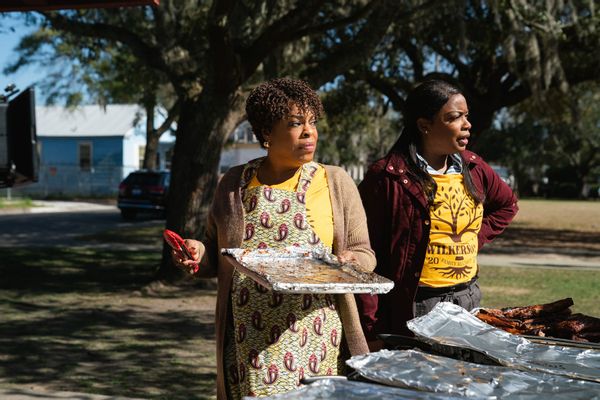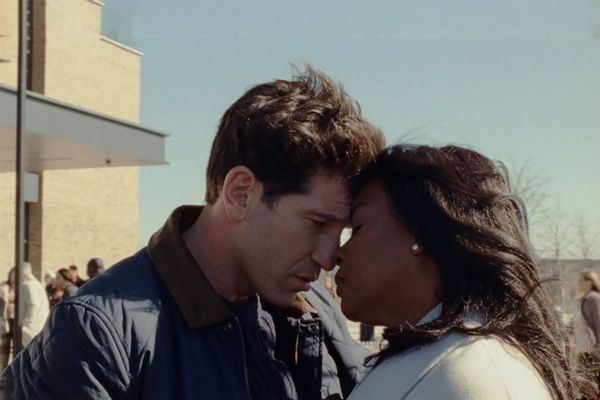Ava DuVernay’s “Origin” synthesizes a massive human injustice in something personal
Our ability to connect with a film correlates with its capacity to translate what it is saying into a message we can feel in our skin. Ultimately this is the great challenge Ava DuVernay’s ambitious “Origin” has ahead of it, despite the profound beauty and clarity with which she alchemizes her source material, Isabel Wilkerson’s expansive bestseller “Caste: The Origins of Our Discontents.”
She makes a global wound palpable for each of us.
Wilkerson’s book argues that the human tendency to create social hierarchies relegating certain types of people as lesser than others is not always about race. She bolsters her theory by building links between American slavery and Jim Crow, the class system in India deeming the Dalit people to be “untouchable” and the Nazi regime’s codifying of laws leading up to the Holocaust.
Cerebral, provocative concepts like this tend to be made into documentary series, which “Caste” may yet – no, should – become. But in her fictionalized approach DuVernay exerts a level of craft, care and personalization that achieves something the most thoughtful and thorough non-fiction filmmaking approaches struggle to. She makes a global wound palpable for each of us without assigning blame or individual causation but, instead, expressing them through grief and loss.
Instead of tracing the book’s “pillars,” DuVernay walks us through this very human story beside Wilkerson, portrayed with deliberate sensitivity by Aunjanue Ellis-Taylor, as she’s designing its architecture. Such an approach is bound to be viewed askance by those expecting “Caste” to follow a classically prescribed narrative structure. In that view, “Origin” is a movie about a writer.
There are plenty of those – mainly about white writers, men mostly. Their success tends to be dependent on how famous the author or their work is, along with the performance and fame level of the actor portraying them.
“Origin,” however, takes a sociological phenomenon and asks us to look beyond the inherent anger we may feel about the injustices we witness via the script’s leaps through history.
Instead, the film grounds us in the universal pain each person experiences firsthand. For Ellis-Taylor’s Wilkerson, that means contending with the imminent loss of her mother Ruby (Emily Yancy), whose health is declining. Along with Isabel’s husband Brett (Jon Bernthal) and cousin Marion (Niecy Nash-Betts), Ruby is part of Isabel’s core of support and inspiration. Isabel and Brett devote much of their energy to caring for her.
A New York Times editor (Blair Underwood) approaches Isabel to write about Trayvon Martin’s senseless murder in 2012, when the movie begins, and with this, her larger investigation begins to germinate. Underwood’s editor invites Isabel to process the crime into prose, which she declines to do. Instead, it makes her ask why George Zimmerman viewed this 17-year-old Black boy as a threat when all he was doing was walking home from a convenience store, and why these murders keep happening.
Then Isabel’s despairs stack, pressing her to expand her inquiry beyond the United States and diagnose history’s gravest injuries. What is the broader human cost of Nazis burning mountains of books in the 1930s, and how does its regime’s process of dehumanizing the Jewish people link to Jim Crow violence in ‘30s-era Natchez, Mississippi?
If racism is solely based on skin color, then how does one explain the oppression of Dalit workers in India, whose complexions are of the same or similar color to members of dominant castes, and who are still relegated to cleaning open-air latrines with their bare hands?
 Niecy Nash-Betts and Aunjanue Ellis-Taylor in “Origin” (Courtesy of NEON/Atsushi Nishijima)DuVernay has chronicled many stories of anti-Black discrimination in America through such works as “Selma,” “13th” and “When They See Us. “ The way she arranges “Origin” is similar to the approach taken in “Colin in Black and White,” her series co-creation with Colin Kaepernick, in the way that it merges the intimately personal with the historical.
Niecy Nash-Betts and Aunjanue Ellis-Taylor in “Origin” (Courtesy of NEON/Atsushi Nishijima)DuVernay has chronicled many stories of anti-Black discrimination in America through such works as “Selma,” “13th” and “When They See Us. “ The way she arranges “Origin” is similar to the approach taken in “Colin in Black and White,” her series co-creation with Colin Kaepernick, in the way that it merges the intimately personal with the historical.
That effort did not stylistically coalesce as successfully as this, which links its persuasiveness to an acknowledgment that most people would not inherently recognize Isabel’s instincts.
“There’s a lot going on in that big brain of yours. I love that,” says her book’s editor (Vera Farmiga). “But I gotta be honest with you: I don’t understand how the woman that was killed by the neo-Nazis –” she’s talking about Heather Heyer “— how that connects to the Dalit professor, connects to Trayvon Martin, connects to your mom. I don’t see it. Yet. But if you can make people see it, that is an incredible book.”
As Isabel strives to fulfill that directive, so does DuVernay.
“Origin” draws its first and perhaps simplest connection by telling the story behind a famous photograph that went viral in 2011 featuring August Landmesser (Finn Wittrock), a German man who crosses his arms at a Nazi rally in 1936 Hamburg instead of joining fellow citizens in saluting. Landmesser married a Jewish woman named Irma Eckler (Victoria Pedretti), and they went on to have two daughters, but the family was torn apart when he was jailed and eventually conscripted to serve in the war’s final days, and she was arrested by the Gestapo. Both were presumed to have been killed.
The obvious parallels between their love story and Isabel and Brett’s are impossible to miss, a purposeful arrangement on DuVernay’s part. Grasping the compulsion of so many to stubbornly cling to the notion of caste discrimination as a relic, plenty would interpret Landmesser and Eckler’s story as a past crime that’s been remedied, pointing to Isabel as living proof. After all, the author and her husband are legally married, and nowhere in the film do we see overt instances of the two of them facing discrimination.
A memory of their origin story, however, shows Brett asserting his privilege, with her permission, to prevent Isabel from being taken advantage of. Afterward, he turns to her and sheepishly asks, “Did I just mansplain?”
 Aunjanue Ellis-Taylor and Jon Bernthal in “Origin” (Courtesy of NEON/Atsushi Nishijima)DuVernay and cinematographer Matthew Lloyd also make the most of Ellis-Taylor and Bernthal’s stunning chemistry, casting a dream-like veil over their life together, especially the mundane moments. We eventually recognize that is intentional. But even in scenes where Isabel glides through high society with Brett at her side, as Ellis-Taylor captures Wilkerson as a creative intellectual force, Bernthal renders Brett with indelible perceptivity, establishing him as Isabel’s stalwart champion.
Aunjanue Ellis-Taylor and Jon Bernthal in “Origin” (Courtesy of NEON/Atsushi Nishijima)DuVernay and cinematographer Matthew Lloyd also make the most of Ellis-Taylor and Bernthal’s stunning chemistry, casting a dream-like veil over their life together, especially the mundane moments. We eventually recognize that is intentional. But even in scenes where Isabel glides through high society with Brett at her side, as Ellis-Taylor captures Wilkerson as a creative intellectual force, Bernthal renders Brett with indelible perceptivity, establishing him as Isabel’s stalwart champion.
Together with Nash-Betts’ Marion, Isabel’s greatest confidante and relatability filter, the author’s loved ones both ground her and assist her with organizing her ideas into form and action.
So, too, does “Origin” itself synthesize into a story that is at once that of one person and humanity’s broader capacity to relate to one another and wreck each other. Some of that is conveyed in the settings; the film travels to The Empty Library monument in Berlin and the Dr. Ambedkar National Memorial in Delhi where Isabel listens to academics, docents and historians explain their significance.
Ellis-Taylor’s face becomes an epic poem of expertly sublimated frustration and ire.
DuVernay finds more poignancy in the connective tissue between these pauses, as when Isabel sits down with her German friend Sabine (Connie Nielsen) who tells her with an air of “you poor dear” condescension that there is no point or validity in connecting the United States’ history of legalized chattel slavery and segregation with the Holocaust.
“I would just like you to note for yourself,” this white woman says to Isabel, “that American slavery is rooted in subjugation. Dominating Blacks for the purpose of capitalism . . . But for the Jews during the Holocaust, the end goal was not subjugation. It was extermination . . . It’s different.”
Isabel bears this quietly, and in that moment Ellis-Taylor’s face becomes an epic poem of expertly sublimated frustration and ire.
That spark sends her to the Berlin State Library, where she finds a direct and irrefutable link.
Want a daily wrap-up of all the news and commentary Salon has to offer? Subscribe to our morning newsletter, Crash Course.
At that point, though, the true potency of “Origin” has already set into our bones by showing us through the quieter moments in Isabel’s journey how it’s possible to acknowledge this vast pain and humble ourselves enough to take it personally, albeit with equanimity instead of resentment.
It’s in the exchange between Ruby and Brett as she reacts to Trayvon Martin’s killing by agonizing aloud over why he didn’t simply comply with Zimmerman given his show of lethal force, and asks Brett to acknowledge that Black people make some white people afraid simply by being.
It’s in witnessing a pair of Dalit workers gently attend to one another as they endure their nauseating duty.
It’s in the scene where Isabel speaks with the now-elderly friend of Al Bright who was part of the Little League baseball team in Dayton, Ohio, that went to a public pool to celebrate Al hitting the winning ball in game one summer in 1951. He mournfully describes watching as Al was denied entry, left on a blanket outside to watch and eventually humiliated by the pool’s on-duty attendant.
It’s also in a moment when Isabel calls a plumber to help her contend with a flooded basement – a disaster on top of her sorrow – and a man wearing a MAGA hat (Nick Offerman) shows up.
At first, the plumber is barely able to look at her. Eventually, Isabel convinces him to see her humanity, not by behaving deferentially but by confessing the agony of her recent loss and asking about the losses he’s sustained that are similar to her own.
This glimmer of empathy is struck in the middle of a mess they’re both standing in, one in which the plumber could abandon the intellectual but relents, realizing she’s done nothing to deserve such inhumanity. This is the light “Origin” shows within its painful diagnosis. And it doesn’t promise a cure, merely that the hope of finding a common covenant, one person at a time, may have to be enough.
“Origin” is now playing in theaters nationwide.
Read more
about this topic


